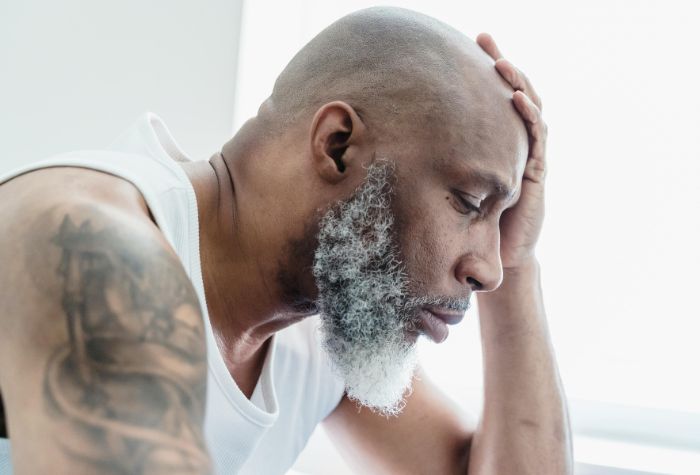Statistically, men are less likely than women to seek help for their mental health. The tragic outcome of this is that more than four times as many men as women die by suicide every year. The men’s mental health crisis has reached a turning point here in the U.S. and we must all do our part to prevent further tragedy.
What Keeps Men From Getting Mental Health Help?
Toxic Masculinity and Being Told to Just “Man Up”
Men have historically been socialized to internalize their emotions instead of talking about them. One survey found that 40% of men had never spoken to anyone about their mental health. The same survey found that, for four out of every ten men, it would take thoughts of suicide to compel them to ask for support for their mental health.
When men are dealing with difficult emotions, they’re often told to “man up” and just get over it. This can include things that are said directly to them in adulthood (“be a man,” “suck it up”) or even starting in childhood (“boys don’t cry,” “stop acting like a girl”). Other times, it’s not direct statements that affect the way men handle their emotions, but what they’ve learned indirectly from society – that men are supposed to be strong, tough and able to overcome any hardship, without help from anyone else.
Dr. Elena Touroni, a consultant psychologist and co-founder of The Chelsea Psychology Clinic says that:
“Men can find it more difficult being open about their mental health and seeking support because it’s likely to go against the kinds of messages they received growing up.”
She also says that many cultures have strong cultural stereotypes around how men should behave. One of the most common of these stereotypes is that men should be “strong.”
Why Telling Someone to “Man Up” Is So Dangerous
Gabriel Nathan, author, editor and mental health and suicide awareness advocate, urges us that the things we say to kids stick with them. In an article for RecoveryDiaries.org, he recounts something that happened to him decades previously in his kindergarten class:
“I remember being in kindergarten, one story time, and being particularly unsettled by a picture of a large spider in a book. Logically, I went and hid under a nearby table. Mrs. Pearlman wasn’t having any of it. ‘Oh, Gabriel,’ she said disapprovingly, ‘Don’t be such a sissy.’ Now, I don’t mean to pick on Mrs. Pearlman, who was actually a wonderful teacher whom I loved very much, but those kinds of things, obviously, stay with you. I have a funny feeling that, had I been a Gabriella instead of a Gabriel, she wouldn’t have said that. ‘Gabriella,’ she might have said, ‘you don’t have to be afraid – come back and sit with the rest of the class. And, the next time you see a picture of a spider: be more assertive.’”
Gabriel also talks about the time he decided to start therapy in college and was told by his therapist’s receptionist that he could use the back door to enter the office if it made him more comfortable:
“I was puzzled … What did it matter which door I used to go to the health center? At nineteen, I wasn’t smart enough to fully comprehend the stigma of mental illness, a stigma so powerful that even well-meaning mental health providers perpetuated it, by offering an anonymous entryway you could slink in through, concealed by hedges and secrecy.”
Mental illness still has such a stigma attached to it that many people still find it difficult to ask for help, but the stigma and shame often seem much more ingrained for men.
Gabriel goes on to say:
“Of course, I know now that there is a stigma surrounding mental illness and the stigma is far greater, in my opinion, if you’re a man. Think of all that the word ‘man’ implies: strength, power, stoicism, assertiveness. Men aren’t supposed to have mental health problems. We are judged and pigeon-holed (in similar ways that women are). I think it’s possible that this stereotype was much more pervasive years ago, when it was more of a pull-yourself-up-by-your-bootstraps, boys-don’t-cry, be a man, quit yer bitchin’ kind of society, but sometimes I think that not much has changed.”
According to Healing Abuse Working for Change (HAWC), phrases like “man up” encourage boys and men to keep their feelings to themselves, even if they’re in a dangerous situation:
“Phrases like this communicate the idea that strength and weakness are essential parts of someone’s sex or gender. These statements imply that men cannot feel hurt or express emotion, preventing them from reaching out if they need help, reporting or seeking help for abuse, or realizing that they are experiencing domestic violence. These statements also cause many men to believe that the only acceptable way to express their emotions is through anger or physical action.”
Men’s Mental Health: How Can We Help?
Change the Way You Talk About – And To – Men
Societal change can take years to happen, which can often feel discouraging. But you can affect real, and sometimes immediate, change around you simply by changing your own attitudes and behaviors. If you’ve ever found yourself thinking or saying that men should always be “tough” or “strong,” consider how your beliefs impact the boys and men in your life.
Related: Sharing Our Personal Experience With Mental Health Reduces Stigma
Be Vigilant for Suicide Warning Signs
When men die by suicide, it’s often a complete shock to their friends and family. They might even say that they had no idea that anything was wrong. And because so many men who die by suicide have no documented history of mental health issues, their loved ones don’t always think to look for signs that something is wrong. If you suspect that someone in your life might be considering suicide, keep an eye out for the following signs:
- A noticeable shift in their mood, even if they seem calmer or happier than usual
- Extreme despair or hopelessness about life
- Talking about, writing or researching death or suicide
- Saying goodbye to family and friends
- Social withdrawal
- Purchasing something which could be used for suicide, such as a gun or knife, or stockpiling pills
- High levels of anxiety or agitation
- Excessive or new alcohol or drug abuse
Encourage Men To Do Something About Their Mental Health
Encourage the men and boys in your life to take control of their mental health. Andy Riggs, morning show radio host and suicide prevention advocate, says:
“We need to stop telling men (including ourselves) to MAN up – instead, we need to OPEN up. We’re wired as men to put on a strong face and carry it all on our own. We need to start talking more openly about our feelings – and when we do open up, we need to do so without apology. We can often be so closed minded and stubborn that we bottle up our emotions and leave them inside, and let me tell you – keeping our emotions inside is part of what’s killing us … Open up to your friends and loved ones, and when they open up to you – listen to them without judging.”
Related: 10 Real Things To Do To Improve Your Mental Health
The Men’s Mental Health Crisis
- Over 6 million American men suffer from depression per year, but it often goes under diagnosed
- Men are more likely to report experiencing fatigue, irritability or loss of interest in work or hobbies, rather than feelings of sadness or worthlessness. This is one of the reasons depression in men is sometimes missed
- More than 3 million men in the U.S. have panic disorder, agoraphobia, or another phobia
- Although men only account for about 10% of patients with bulimia or anorexia, men with an eating disorder are less likely to seek professional help
- In 2022, over 79% of suicide victims were men
Why Is the Suicide Rate in Men So High?
Out of these statistics, the rate of male suicide victims compared to female victims is perhaps most alarming. Why such a difference?
Some of the factors that contribute to the high suicide rate in men include:
- Men are less likely to seek help for their mental health
- Men are more likely to use more violent methods that are more likely to result in a completed suicide
Men’s Mental Health Support at WTCSB
If you need a little encouragement and support on your mental health journey, we’re here for you. Western Tidewater Community Services Board is your local single-point-of-entry for mental health services, developmental disabilities support, and substance abuse services in Franklin, Suffolk and the counties of Isle of Wight and Southampton. If you’ve been putting off reaching out for help, don’t wait any longer. We can connect you to therapy, substance abuse treatment or whatever else you may need.
Let’s move forward, together.






